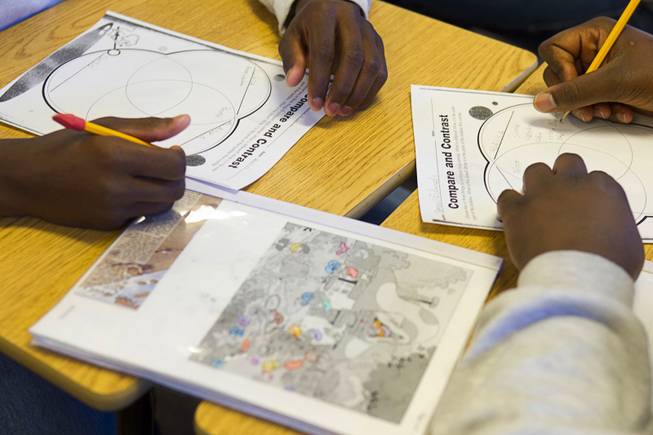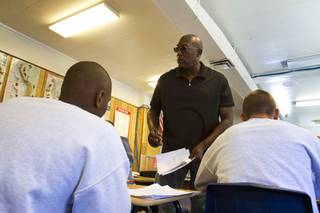
Students work during a reading class at the Spring Mountain Youth Camp on Mount Charleston Wednesday, June 27, 2012. The camp is a staff-secure correctional facility for male youth offenders between the ages of 12 and 18. The boys take classes at the Spring Mountain Junior/Senior High School which is operated by the Clark County School District.
Monday, July 2, 2012 | 2 a.m.
Spring Mountain Junior/Senior High School
Related stories
- 14 schools earn five-star status in School District’s high school rankings (05-24-2012)
- Clark County School District announces rankings of top- and lowest-performing elementary, middle schools (2-23-2012)
- New school rankings unveiled with much fanfare, but some teachers grumble (2-24-2012)
- Top-rated schools found in wealthier areas, but School District vows change coming (3-12-2012)
- 10 surprising facts about the School District’s new school ranking system (3-12-2012)
- School finds measurable ways to help students achieve success (3-12-2012)
At the front of the classroom, science teacher Ken Smith commanded the attention of his students — all teen boys clad in similar gray shirts and blue jeans.
“Who did not turn in their lesson seven?” Smith asked in an approachable, yet direct tone.
Papers shuffled, and one boy handed his forward. It was shortly after 8:30 a.m. Wednesday, which at an elevation of 8,500 feet on Mount Charleston means school time for juvenile offenders at Spring Mountain Youth Camp.
Lazy days of summer are not an option for boys 12 to 18 years old sent to Spring Mountain, a staff-secure correctional facility that juvenile justice officials hope sets these young offenders on a better path in life.
Officials know a large piece of that puzzle hinges on education, a common indicator of post-release success. That’s why a group of Clark County School District administrators journeyed up the mountain Wednesday: As they develop a ratings system to evaluate alternative school settings, they wanted a firsthand glimpse of the camp and its classrooms.
This past school year, the School District rolled out a rankings system for its elementary, middle and high schools, which rated schools on a five-tier scale. Numerical scores in a variety of categories were calculated to determine the highest-performing, five-star schools down to the one-star schools.
Alternative schools, such as Spring Mountain Junior/Senior High School, demand a separate rating system because of their different structure and challenges, school officials said. One challenge is that boys sent to Spring Mountain typically serve a six-month sentence — a period shorter than a normal school year — which makes it difficult to track the school’s performance given the constantly changing student body.
“We just have to figure out what’s fair,” assistant superintendent Bradley Waldron said.
As Principal Frank Cooper led the group through Smith’s classroom and several others, he frequently called the combined junior/senior high school a “family” setting.
“I’m really fortunate to have the staff I do,” he said. “If you don’t like the youth, you shouldn’t be here.”
It’s likely the students and staff feel the same way about him. Cooper commutes 90 minutes each way from Pahrump to lead the youth camp’s school, and he makes it a priority to attend the students’ football games across Nevada. (Spring Mountain has football, basketball, baseball, wrestling and track teams competing in the state’s 1A division.)
“I show up at a game, and they light up,” Cooper said, referring to the students.
Many have never played team sports before coming to Spring Mountain, let alone attended school on a regular basis, officials said. The latter leads to a wide range of academic achievement among boys at Spring Mountain.
The teens end up at Spring Mountain often after three or four arrests for a variety of offenses, including burglaries, drug- and sex-related crimes, Cooper said. The county-run camp operates by “line-of-sight supervision,” meaning there’s no barbed wire or individual jail cells. The teens live in dormitory-style housing staffed around the clock by probation officers.
During the day, they attend school. Some participate in the camp’s forestry program, where they can make money creating and maintaining trails on Mount Charleston under a partnership with the U.S. Forest Service.
School is year-round at Spring Mountain, partially to help the teens catch up on coursework, officials said. At the end of the teens’ stay, they’re evaluated on how well they performed academically and behaved in the dormitories — all part of the camp’s mission to hold them accountable for their actions, Cooper said.
“They find out that, ‘Hey, I have to be accountable to someone,’” said Cooper of the teens’ first few days at Spring Mountain. “I think that’s the main ingredient.”
The school also places a heavy emphasis on career training and exposing students to new learning environments. There are classes in carpentry, embroidery and alternative energy. In the fall, an art teacher will join the small staff, Cooper said.
“We found that our graffiti people might need a different outlet,” he explained.
The concept doesn’t win over every youth offender. More than one has tried to flee down the mountainside, school officials said.
Others, like a 17-year-old on the school’s track team, said they appreciated their time at the camp. The teen said he had developed a passion for the long jump, earned his General Educational Development diploma and saved money from the forestry program work to pay restitution.
“It’s fun. It’s a better place to be than anywhere else,” he said. School and camp officials asked the Sun to withhold students’ names, citing privacy.
In May, the camp started Thinking for a Change, a cognitive behavior-change program that encourages offenders to consider the consequences of their actions, Cooper said.
“Most of these kids make impulse decisions and it impacts them,” said Lamont Hicks, a probation officer and football coach at Spring Mountain. “Hopefully, when they get older, they can keep using these tools so they don’t make the same mistakes.”
As the school’s transition counselor, Tom Griffin is charged with helping make that happen. When a teen is released from Spring Mountain, Griffin coordinates the student’s return to a mainstream school and strives for a successful outcome.
Griffin told school administrators those occasions can prove tricky, especially when schools aren’t receptive to a youth offender’s return. He urged patience and support from other district schools.
Griffin said Spring Mountain boasted that type of environment, which is why it’s in teens’ best interests to forgo criminal activities upon release.
“After this program, it gets worse a lot fast” for teens arrested again, he said.
Posters lining the wall of one dormitory serve as a subtle reminder of that better path in life. The homemade signs list dozens of careers, describing education requirements and median pay.
The simple concept piqued the interest of the school administrators. In the end, even they weren’t leaving Spring Mountain without learning a thing or two.
“That’s a great idea,” Waldron said. “Maybe we should have that in some of our downtown schools.”


Join the Discussion:
Check this out for a full explanation of our conversion to the LiveFyre commenting system and instructions on how to sign up for an account.
Full comments policy